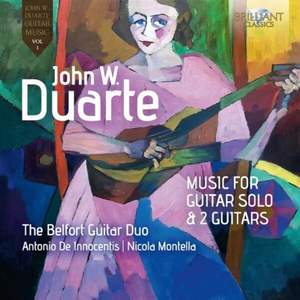For this first monographic recording of works by John Duarte for more than 20 years, the composer’s son, Christopher Duarte, along with the artists, selected repertoire spanning three decades, with a focus on pieces that were last recorded long ago or remained unrecorded.
Opus 77 is the second in a total of seven English Suites, all for different instrumental combinations. Each movement uses an English folk song for its main thematic material. The result is a bright, sometimes sentimental, evocation of English country life. For the Suite Ancienne, a set of variations based on the ‘Première Bransle Gay’ in Pierre Phalèse’s Premier Livre de Danseries (1571), Duarte fashioned a Baroque Suite, minus the Allemande, drawing all thematic and harmonic material from Phalèse’s simple piece.
Canción y Danza was written as a compulsory competition piece and named in honour of Spanish pianist–composer Antonio Ruiz-Pipó’s like-titled work. The slow Canción displays a nostalgic and dramatic quality, whereas the fast Danza is almost ironic, capturing the spirit of Ruiz-Pipó without mimicry. The Badinerie was intended to be a movement in a large-scale, ultimately unfinished Suite française. It was transcribed almost note-for-note for two guitars from the third movement of the Concertante Quartet op.22 for guitar and string trio. The music is playful and full of intertwining melodic lines, with each guitar having equal responsibility for harmony and melody.
Danserie no.1 is the first of four derived from the like-named collection of 1551 by Tielman Susato. Its three movements encompass disparate dance forms including an ‘Interrupted Polka’, a Galliard and a Piva (an Italian Renaissance dance). The second Danserie’s two movements reflect Latin dance types: the Tango and Tarantella.
In Mutations, each movement is a microcosm of a composer’s style and place, with musical portraits of Dowland, Scarlatti, Haydn, Brahms, Albéniz, Charlie Parker and finally Duarte himself. Sans cesse op.34 was commissioned by Ida Presti, who wanted a piece “for an encore, and with lots of effects”. She sadly died one week before it was completed. The music, a true moto perpetuo, demands the utmost dexterity and coordination of the players.
Played by Nicola Montella (guitar solo) and the Belfort Guitar Duo (Antonio De Innocentis and Nicola Montella)



